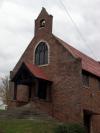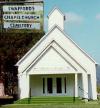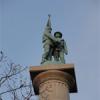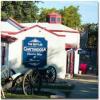TN's 127 Sale Historic Sites
from users
19 items | Created 07/20/2012
Use/Customize | Download | Print

This is the birthplace of Cordell Hull Secretary of State during the Roosevelt Administration. He was a winner of the Nobel Peace Prize and is known as the Father of the United Nations. The Cordell Hull Birthplace and Museum is a historic site owned by the State of Tennessee.

The Sgt. Alvin C. York State Historic Park, located in Pall Mall, Tennessee, pays tribute to Sgt. Alvin C. York, the backwoods marksman from the mountains of Tennessee who became one of the most decorated soldiers of World War I.

Founded by the Virginia minister John Dillard in 1821, Alpine Institute would be burned by both guerrilla fighter in the Civil War and shortly thereafter by the Klu Klux Klan. Years later, in 1880, the school was re-established by the future Tennessee governor, A.H Roberts, and developed into one of Tennessee's most competitive rural schools.

Historic York Institute in Jamestown, Tenn., was built with funds raised by the famous WWI hero, Sgt. Alvin C. York during the 1920s. The Alvin C. York Institute is currenlty a public high school in Jamestown, Tennessee. It is the only comprehensive secondary school in the United States that is financed and operated by the state government.
Sorry - this asset has been deleted

Barton Chapel is a historic chapel on US 27 in Robbins, Tennessee. It was built in 1926 and added to the National Register in 1984.

The Monterey Depot Museum was recently opened to preserve and promote the rich railroad history of the Cumberland Plateau including lines such as the Nashville and Knoxville Railraod, the Tennessee Central Railroad, the Louisville - Nashville Railroad and the Nashville and Eastern Railroad. They provide an assortment of interactive displays and fresh programs that bring the areas railroad history to life.

Camp Crossville was a prisoner of war camp during World War II. It housed German and Italian officers beginning in November, 1942 until the close of the war. The original infurmiry building and other remnants of the prisoner camp can still be seen among its current use as the largest 4-H camp in Tennessee.
Displays include personal items, letters, documents, medals, and artifacts from the Civil War, WWI, WWII, Crossville POW Camp, Korea, Vietnam, and Iraq.
As the largest historic district in Tennessee, the Cumberland Homesteads is one of the New Deal Communities built by the Division of Subsistence Homesteads between 1934 and 1938. Discover this unique community, planned by architect, William Stanton with a tour to the Homesteads Tower Museum.

An original log church was built by Thomas Swafford in the 1820s and was served by circuit riding preachers. The lumber of a second building is said to have been used to build barracks for Federal soldiers during the Civil War. The current structure was built in 1912 as a part of the Methodist Episcopal Church, South.

Built in 1872, this house and its outbuilding once belonged to the Confederate veteran Dr. James Ross. In the 1940's the house served as the county hospital and many of Pikeville's current residents were born in the rooms of this house.
Visit the site of the famous trial between creationism and evolution, a debate that continues today. The Scopes Trial of 1925, placed a teacher on trial for teaching evolution in the classroom and has continued to retained a growing worldwide inerest into the present day.
The Sequatchie Valley Historical Association, formed in 1984, set a goal to build an exact full size replica of the original coal company store "Commissary". Hundreds of donated mining artifacts are on display inside the museum. The museum currently houses the largest collection of regional historic coal mining photographs in the state of Tennessee.
Since 1824, Ketner’s Mill has been a place that shaped the lives of the Ketner family and those who settled in the Sequatchie Valley of Southeast Tennessee. The story is one of beginnings, growth, progress and community all told at once through Ketner’s Mill.
_sm.jpg)
The Grundy County Historical Society is dedicated to preserving the history of the Grundy County, Tennessee area and the genealogy of its people. The Society is a non-profit organization devoted to genealogy and historic preservation.

The Jasper Regional History Museum harbors a collection of memorobillia and artifacts from the county's Native American history, the Civil War & the Great Depression . Whether you live in Marion County or you are passing through the area, this is a good place to check out if you have an interest in the colorful history of small towns and their environs.

Known as the "Gateway to the Deep South", the control of Chattanooga, TN was a vital goal for both the Union and the Confederacy during the Civil War. In 1863, they fought for control, and the battlefields at Lookout Mountain and Chattanooga preserve this historic struggle for control in what were some of the most vicious conflicts of the Civil War.

Located on Lookout Mountain at the entrance to historic Point Park, The Battles for Chattanooga Electric Map & Museum is the perfect starting point for your tour of the area's Civil War battle sites.
 button to add them to your planner, then Print or Download your itinerary for the driving directions to each stop on your trip plan.
button to add them to your planner, then Print or Download your itinerary for the driving directions to each stop on your trip plan. 



 Create a Trip!
Create a Trip!


